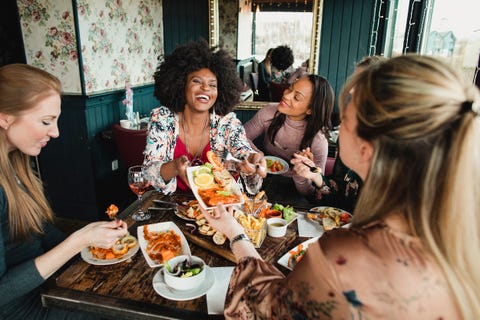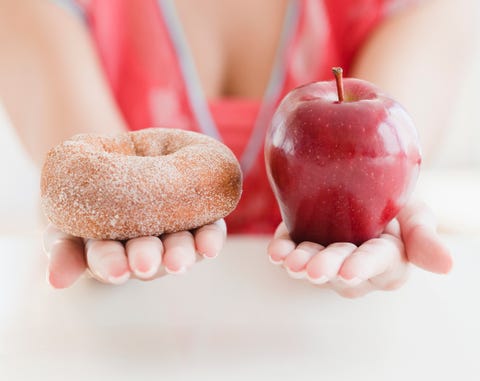Pros and Cons of Raw Food Diet for Cats
In the world of dieting, there's always something new and shiny, promising to be the thing that will finally work for you. The 80/20 Diet is just that, and it suggests you can have your cake and eat it, too. But is that true, and does the 80/20 Diet really work in the long-run? Woman's Day spoke to New York City-based registered dietitian Mary Jane Detroyer, MS, RDN, CDN and Toronto-based registered dietitian Abby Langer, RD, to learn the pros and cons of the 80/20 Diet.
What is the 80/20 Diet?
As the name suggests, the 80/20 Diet is about proportions. It's based on the principle that if you eat "healthy" 80 percent of the time, you can "cheat" the other 20 percent. Some people break this down by saying that of your weekly meals, you can have four "cheat" meals so long as the rest are "healthy." Others see this as healthy eating during the week and eating whatever you want on the weekends.
There are no rules for what exactly you eat during the "healthy" portion, but it is often based on the food pyramid. For example, fats should be limited and come from things like nuts, seeds, and healthy oils. Grains should be whole grains such as quinoa, farro, or whole-grain pasta.

SolStock
And the 20 percent? You can go ahead and eat whatever you want.
The diet aims to simplify things for people and to give them a set outline on how to eat different meals, without being too restrictive.
What are the potential benefits of the 80/20 Diet?
The premise of the 80/20 Diet is that you're eating healthy foods the majority of the time. Of course, general healthy eating can have many benefits, such as lowered cholesterol, weight loss, improvement in mood and energy levels, among others. Another benefit of the diet is that it provides structure without being too rigid, and it allows an individual to have more control over how they want to execute the diet.
The notion of the 20 percent of dietary freedom means you still have the flexibility to indulge your cravings. This is supposed to allow people to feel less guilty about indulging in unhealthy food because it can count as part of their 20 percent. Langer, however, says a diet that categorizes food into "healthy" and "unhealthy" can actually end up leading to more feelings of guilt. Langer says the idea of the 80/20 Diet, of eating mostly nourishing foods most of the time is good in theory. "But when you start saying I can't eat that because it's 'bad,' or this because it's 'good,' it can create a real feeling of guilt. My recommendation would be not to break it down by 80/20, just eat what you want, trying to make more nourishing choices more often."
What are the potential downsides of the 80/20 Diet?
Detroyer's main issue with the 80/20 Diet is that the set parameters go against intuitive eating, which she describes as listening to your body and eating based on what it feels like it wants. It's about working to understand your body, and listening to it. Say you wake up one morning desperately craving pancakes. Intuitive eating would allow you to listen to your body and whip up a batch of Bisquick. With the 80/20 Diet you could potentially still eat the pancakes, if you count it as one of your 20 percent meals, but you would have to acknowledge eating it as part of the "unhealthy" or "bad" category.
"The categorization of food into 80 and 20, good and bad, can be very harmful," Langer says. "It's so subjective. So there's no real official categorization of what's a 'good' food or what's a 'healthy' food or 'unhealthy' food. It really depends on your situation, your likes and dislikes, and frankly what you can afford."

Jamie Grill
Langer says that categorizing food into "good" and "bad," "healthy" and "unhealthy" can lead to increased feelings of guilt and negative feelings overall towards eating and food. "Eating should be a fun pleasurable experience," she says. "It should never be associated with guilt and shame. It takes away from the eating experience that can be pleasurable and social and fun and nourishing, psychologically and physically. Research has shown people who feel guilty or shameful about the things they eat tend to eat more. In my practice and my life I look at 'nourishing' in terms of the physical and the psychological, the emotional."
Another thing to consider is how limiting your indulgences to a specific time frame can cause you to consume more calories and more unhealthily than if you practiced intuitive eating.
"Let's say you're going out to dinner and you're on your 20 percent," Detroyer says. "You order an appetizer, and you eat the whole thing. And you order your dinner, and you start to get full. But you get a dessert because you're on your 20, and then you're stuffed, rather than listening to your body."
For people who take the week vs. weekend approach to the 80/20 Diet, the two days of splurges can feel like they cancel out the healthy eating done during the week. This can lead to a cycle of feeling like you're building up and then tearing yourself down.
"These kinds of formulas don't tell people to focus on hunger or fullness," Detroyer said. "The diet culture means you're relying on someone else to tell you what to eat and when to eat, which is absolutely ludicrous. The reality is that's now how our bodies work."
What impacts can this diet have on women specifically?
When it comes down to it, Detroyer says, dieting is about losing weight and gaining control over the body. But dieting can have a large impact on the mind, too.
"We live in a culture that tells women they should look a certain way, and that that they should look sexy, that it's important to attract men," she says. "Over the years how women are supposed to look has changed. Over 100 years, the ideal body type has changed and morphed. Right now we're in the healthy toned muscular phase which is totally in contradiction to how a woman's body should be because we need extra fat to support estrogen and support life."
The potential mental ups and downs that can accompany the 80/20 Diet can lead to increased feelings of guilt and failure, especially in women who tend to be more sensitive to these feelings because of these high societal pressures.
The bottom line.
"The solid research on these diets is that they do not work," says Detroyer. "And the reason... is because they're impractical and people cannot live by them forever. It's a short term fix."
The 80/20 Diet is just a re-packaged, re-branded way to control what you're eating, Detroyer says. Instead of a fad diet, she recommends focusing on intuitive and mindful eating, which will lead to lasting effects in your relationship with eating and nutrition.
"There's no successful formula other than hunger and fullness," Detroyer says. "Eating when you're hungry and stopping when you're full. That's the formula, to me."
Kelsey Hurwitz Assistant Digital Editor Kelsey Hurwitz is the assistant editor of WomansDay.com, and covers entertainment, holidays, pets, and good news.
This content is created and maintained by a third party, and imported onto this page to help users provide their email addresses. You may be able to find more information about this and similar content at piano.io
Pros and Cons of Raw Food Diet for Cats
Source: https://www.womansday.com/health-fitness/a30259195/what-is-the-80-20-diet/
0 Response to "Pros and Cons of Raw Food Diet for Cats"
Post a Comment